One month after pressing the pause button, Shanghai has identified two batches of "white lists" of more than 1,000 key enterprises, covering key industries such as integrated circuits, automobile manufacturing, equipment manufacturing, and biomedicine. ” and “Social Zero” continued to advance, and gradually put into production.
With Shanghai's status as China's economic center, the recovery of production and supply chains will become an important part of the Chinese and even global economy. The recovery and advancement of this link is not only the demand of the industry, but also the needs of people's livelihood, and it is also the general trend of society returning to normal operation. However, the return to normal order cannot be achieved overnight, it will be a slow recovery process.
The impact of the epidemic and the downturn in the market have made most brands choose to keep a low profile in order to show the sympathy and moral support of enterprises. So in the recovery process, what roles and what can brands, enterprises and social organizations play in the post-epidemic economic recovery, the revitalization of market confidence, and the boosting of community morale?
We have compiled excellent cases from various industries and categories in different markets around the world in the WARC think tank, and will analyze and interpret the cases from multiple perspectives through the "Case Dry Goods" series, aiming to bring lessons to practitioners. This issue is the second issue, starting from the analysis of 4 cases:
- Reshape the role of the brand in the festival culture during the market downturn, get more help
- Using social platforms and digital technology to "recover" the livelihoods of vulnerable groups
- Connecting with the community and igniting urban exploration through personalized customer experiences
- Turn your audience into your advocates and advocates to help your organization continue its mission
1. Reshape the role of the brand in the festival culture during the market downturn
The holiday season has always been the peak season for candy sales, an important pillar of gift products, and an important node for manufacturers to deploy gift scenes to stimulate consumption. But after the new crown epidemic, consumers have reduced their enthusiasm for festivals and reduced the idea of gift-giving. This is a big difficulty for brands that are strongly dependent on festivals, both in terms of business sales and brand building.
However, under the blow of the epidemic in India in 2020, the consumer sentiment in the Indian market is sluggish. The offline sales of Cadbury Celebrations, the main business channel of festival-focused chocolate brand Cadbury Celebrations, have been limited due to the blockade, and alternative online channels have not been established. How to minimize losses, reverse the downturn, and restore confidence in the industry within the short-term window of Diwali gift-giving, without disgusting consumers?
Cadbury realized that asking consumers suffering from the pandemic to pay for the product was not feasible, and this was an opportunity to implement the brand's purpose by calling on society to help small local businesses. Cadbury re-decodes the gifting culture of Diwali in India, reinventing the role of its brand in this context, saying: "When we support the small local shops, we can all have a happy Diwali".
Cadbury launched the "Not Just ACadburyAd" campaign, involving artificial intelligence and location-based customization technology in a series of actions such as regional placement of ads, helping small retailers across India to automate and personalize small merchants to promote their store so that every ad is highly relevant to the viewer.
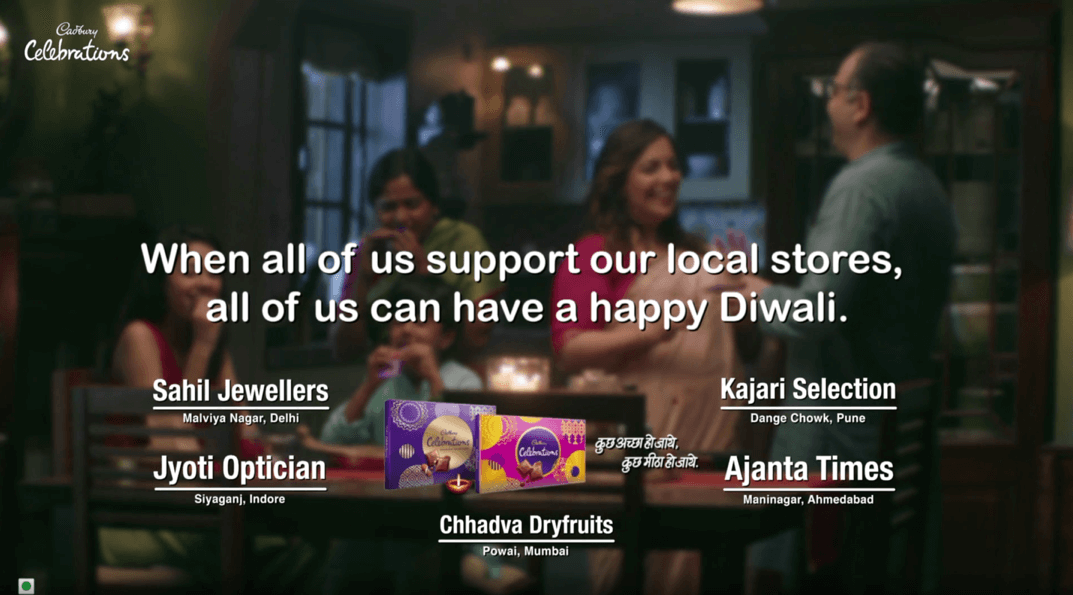
The campaign garnered 100 million views and earned about $1.5 million in earned PR value. Through this round of festive marketing, Cadbury Celebration has helped thousands of local small businesses pick up business, not only boosting market sentiment and revitalizing category performance during the festival, but also achieving a 6% increase in brand consideration and 32% in sales Forehead.
The following year, Cadbury launched an iterative and upgraded version of this data-driven campaign NotJustACadburyAd. Through cooperation with artificial intelligence-driven company Rephrase.ai, it used machine learning technology to reshape Cadbury brand ambassador, Bollywood superstar celebrity Shah Rukh. ·Shah Rukh Khan's appearance and voice helped more than 2,000 local small shops realize personalized advertisements with sincere recommendations and endorsements from superstars, and received the dual blessing of artificial intelligence and big stars.
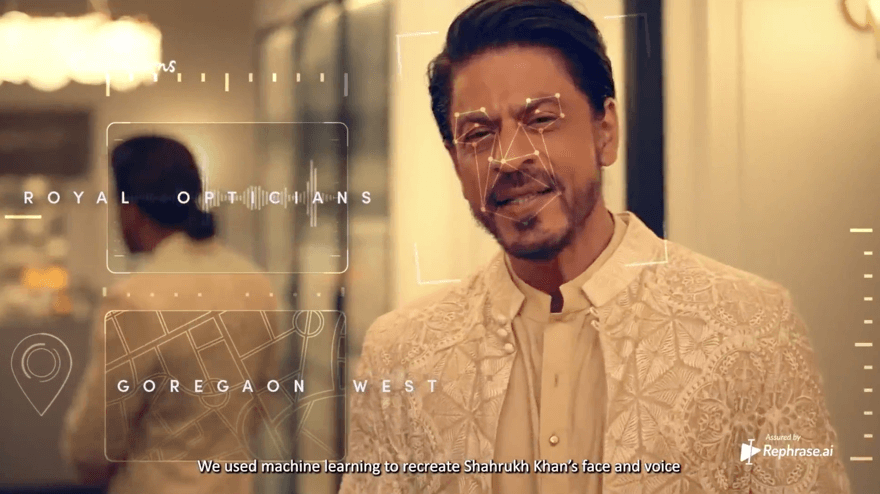
Community constitutes the foundation of a society, and community spirit is the key force that enables a scattered collection of individuals to coalesce into a society. When brands try to awaken the selfless side of human nature, pass on the torch of community spirit, and turn marketing activities into a leverage of goodwill, they can turn it into a community movement with a domino effect.
Although consumer-centricity is usually the first principle practiced by any brand, it is not enough to just focus on and care about consumers. It is necessary to look far ahead and take other relevant people into consideration in order to more comprehensively contribute to the long-term planning of brand health. . After doing so, the individual in each ring, whether it is the end consumer or the front-end salesperson, whether it is the hawker in front of the stage or the brand behind the scenes, will benefit from it.
"Cadbury Celebration Cadbury: Not Just A Cadbury Ad"
Brand: Cadbury Celebration
Brand owner: India Mondelez Foods Co., Ltd.
Main agency companies: Ogilvy & Mather (India), Weimai (India)
Market launch: India
Case source: 2021 WARC Awards for MENA Strategy Grand Prize, E-Commerce Special Award and Early Adopter Award.
👉🏻WARC subscribers can click here to jump to read the full case
2. Use social platforms and digital technologies to "recover" the livelihoods of vulnerable groups, and help themselves in times of crisis
Since 1991, The Big Issue has helped tens of thousands of socially disadvantaged people reintegrate into their local communities as micro-entrepreneurs. By peddling on the streets everywhere, magazines provide these vulnerable and homeless people with a way to earn a legitimate income. When the UK's first lockdown hit in March 2020, its weekly sales went from 80,000 magazines to zero, and more than 2,000 street vendors were forced to suspend sales.
Without the ever-flowing, bustling streets, the hawkers have no income. Not only did this obliterate their livelihoods, it also disrupted their connection to the community. Most hawkers feel lonely: losing their livelihood is not the most terrifying thing, but the sense of isolation in a closed situation that makes them lose their sense of purpose. Dazhi Magazine and their retail hawkers are facing an existential crisis.
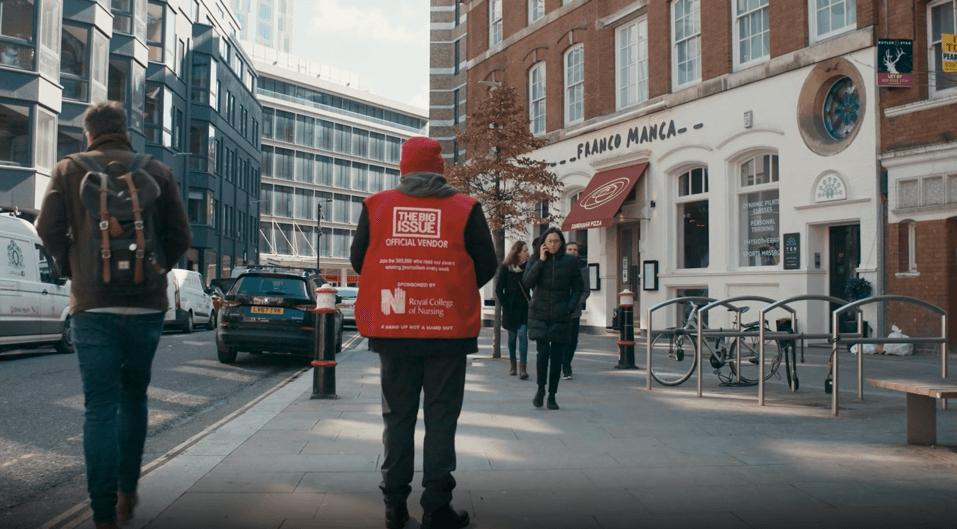
They have provided financial assistance and support to hawkers for the future of Dazhi Magazine as a social enterprise. But it also only helps to secure food and shelter for them. It does nothing for the hawkers' self-esteem, sense of purpose, or connection with customers. Even if the lockdown is about to end, there will be opportunities for hawkers to return to their regular stalls in high streets and business districts, where foot traffic will never return to pre-pandemic levels.
How to reach out to inspire, not to give? Dazhi Magazine needed a plan to ensure its vendors could transact and interact with customers without physical contact. There are two main challenges to migrating their business online: 1) Baseline surveys show that hawkers lack digital skills and equipment; 2) How to find their regular customers without a predictive digital database.
Overcoming the second hurdle is crucial, as research shows that customers support Dazhi Magazine because of their special bond with the hawkers. Identifying the hawkers' "regulars" is key to unlocking their highest-value audience and the success of the program. Analysis in partnership with LinkedIn shows that 70% of the hawker's previous customers are active on the platform. They can then identify old customers by cross-comparing workplaces and hawker sales pitches.
Using LinkedIn data, digitally rebuild the hawkers' former communities and reconnect them with the same professionals who pass by every day. "Raising Profiles" - a digital inclusion project aimed at boosting hawkers' digital confidence, building online networks and using LinkedIn as their virtual "street corner" was born.

Not only did the vendors receive donated tablets, but also resources such as group and individual training sessions, and the project helped them build and promote their profiles on the platform. After an 8-month hiatus, they were able to rebuild and restore their customer base and prepare for an e-commerce-triggered business model. In addition to giving them a sales channel they couldn't do before, the partnership enables hawkers to talk to regular customers and alleviate feelings of isolation and exclusion.
With 96% of total traffic driven by LinkedIn, the platform saw a significant increase in subscriptions, with hawkers increasing their subscriptions by 325%. Magazine sales are up 400%. The partnership has also significantly improved the efficiency of vendors, from a conversion rate of 1 sale per 50 offline interactions to a conversion rate of 1 sale per 10 interactions on the LinkedIn platform.
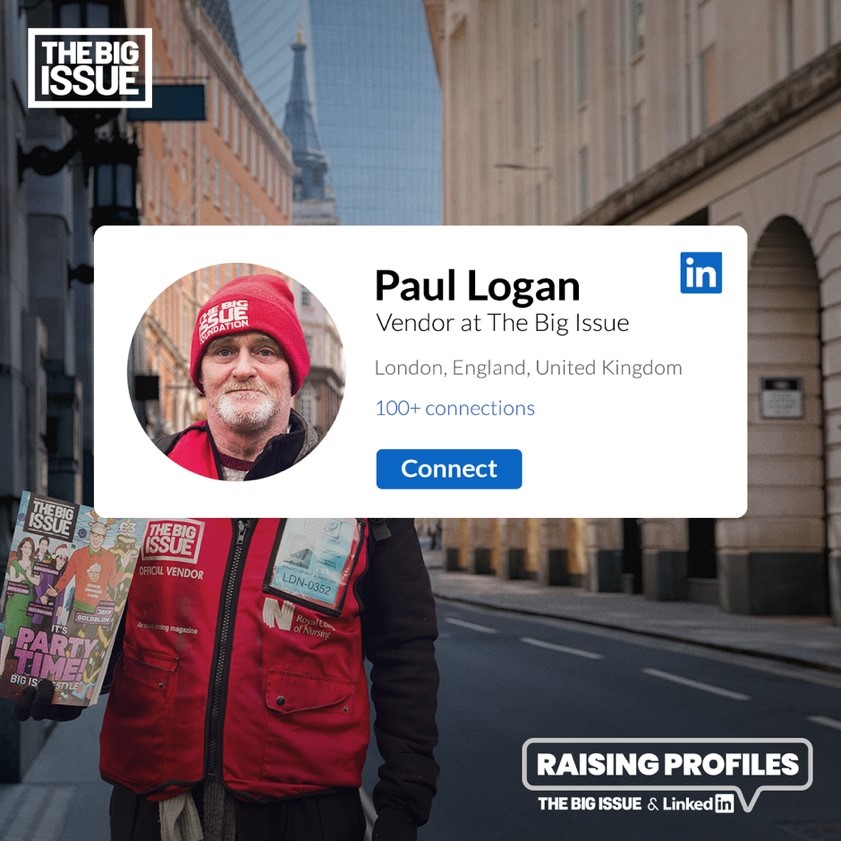
The release of the project has been reported by a large number of major news media in the UK, and forwarded by celebrities, achieving an excellent exposure of 100 million. In addition to helping some of the most vulnerable people regain their income, it also helps address the ongoing connection between brands and vulnerable groups. An even bigger advance: a permanent shift in the public's perception of magazine peddlers, who are now also seen as professionals on LinkedIn.
Using the power of digital data and social media, this case used its creative strategy to help Dazhi Magazine's vendors digitally recreate the "streets" they used to roam back and forth to sell the magazine. By providing resources and helping to empower distribution hawkers to digitize their businesses, it has responded to and subverted the sales scenarios that were interrupted under the epidemic, effectively helping them return to the block, reconnect with customers, restart revenue sources, and regain the right A sense of control over life.
In recent years, many companies have incorporated the DEI (Diversity Equity Inclusion) project, that is, the "diversity, equality and inclusion project" into the corporate culture and strategic agenda, and the discussion on this topic in the society is also very hot. The case of Dazhi Magazine and Linkedin has brought significant changes and long-term benefits to the development of vendors and organizations, and also provides a practical sample worthy of reference for more brands to explore the long-term sustainable development of enterprises in the future.
The Big Issue & LinkedIn: Raising Profiles
Brand: The Big Issue Magazine/Linkedin
Agency: FCB Inferno
Placed on the market: UK
Case source: Cannes Creative Lions, Silver, Creative Strategy Lion, 2021
👉🏻WARC subscribers can click here to jump to read the full case
3. Connect with the community and ignite people’s desire to explore the city through a personalized customer experience
Lexus UX is the brand's first cross-border SUV for urban exploration. It is mostly used to explore natural scenery and travel across continents. However, in the face of the dense and crowded environment in Hong Kong and the monopoly of the three German giants, And the growth predicament of the auto market under policy restrictions, its promotion is difficult. The brand hopes to explore the potential consumer market in Hong Kong and gain more market share.
Lexus has found a niche that is "seeking change." Although this group has a small base, as long as a conversion rate of 0.05% is achieved, the expected sales target can be achieved. By inversely pushing the KPI to every step of the planning, they found that with the project's meager advertising budget, the risk of driving sales by driving website traffic is quite high, but in fact, as long as the test drive rate and test drive conversion rate are slightly increased, can have a significant impact on final sales.
In Hong Kong, the world's most expensive real estate market, small businesses struggle to survive. And this just gives the brand an excellent opportunity to link audiences who are willing to explore with small merchants, and explore the unknown "small but beautiful" in familiar cities. Therefore, Lexus decided to take the test drive experience as a core link and created a data-driven test drive experience platform "Small Business Drives".
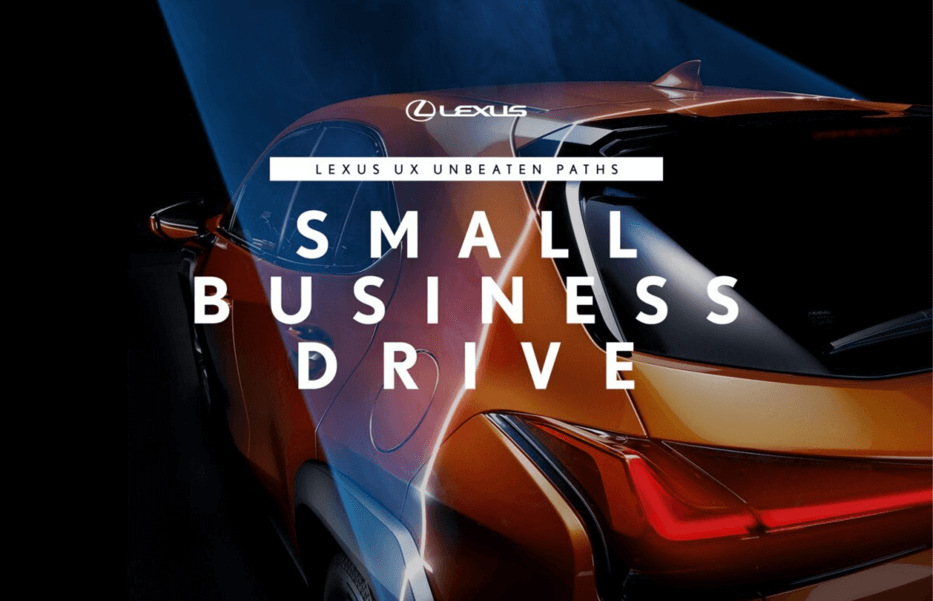
Relying on the flexible use of big data, Lexus makes each potential customer's test drive a unique and personalized experience: around the customer's life and hobbies, it leads potential customers to explore the hidden and interesting shops in the city of Hong Kong. The event achieved sales that exceeded the expected target by 1.45 times, making Lexus the third largest luxury car brand in Hong Kong in one fell swoop, achieving a 24:1 return on investment, increasing UX sales and actually driving the development of small merchants.
After Hong Kong entered a period of turmoil due to political conflict in the second half of 2019, the plight of small businesses in the real economy is even more difficult. Inchcape Group, the operator of Lexus, has also decided to open the platform to other brands of its models to support more local small businesses through more free publicity exposure and high-quality flow of people.
Under the new normal of the global epidemic, consumers cannot be moved by the marketing routine of wake-up baptism. Merely proclaiming to the world that your brand will take action to make the world a better place is probably in vain. Brands and enterprises can only turn various loud "slogans" into actual "actions", work hand in hand with consumers and the community. Together in the same boat, we can achieve a win-win situation.
Lexus Lexus: Out of the ordinary, a journey of discovery Find the Unbeaten Path
Brand: Lexus
Brand owner: Toyota Group
Main agency: TBWA Hong Kong
Market launch: Worldwide
Case sources: WARC Awards for Chinese Strategy 2020 Gold Award for Smart Budget Steward, 2020 WARC Awards for Asian Strategy Gold Award, Customer Journey Award.
👉🏻WARC subscribers can click here to jump to read the full case
4. Turn your audience into your advocates and advocates to help your organization continue its mission
Canada's Science World is not only a well-known tourist attraction in Vancouver, but also a non-profit organization dedicated to science education. In 30 years, its STEAM education program (integrated education integrating science, technology, engineering, art, and mathematics) has reached 18 million people in British Columbia. It also provides a variety of science education programs and resources for countless children and teenagers.
As a non-profit science education organization in this niche market, the world of science offering unique products has few real competitors. But as the Covid-19 pandemic hit and its doors closed, it no longer had visitor revenue to support these vital programs. 85% of the organization's revenue previously relied on ticket sales from visitors. How to raise funds to continue supporting its STEAM project became a priority.
Businesses across British Columbia have closed due to the pandemic, and unemployment is even higher than it was a decade ago during the financial crisis. Canadians are also facing more financial strains and fewer donations. How to give them a strong enough reason to donate in this situation? The scientific world went back to the source of all this: the epidemic virus, and they found that the solution to the bottom line was science itself.
Scientists are more important to humanity's present life and future than ever before. The new crown epidemic has made it increasingly clear that the survival of mankind depends on scientists. Respected "nerds" like Bill Gates, Larry Page, and others were already ruling the world when the smartest people on the planet invented and engineered vaccines. And that's what the scientific world has been cultivating for years: "nerds" and future scientists.
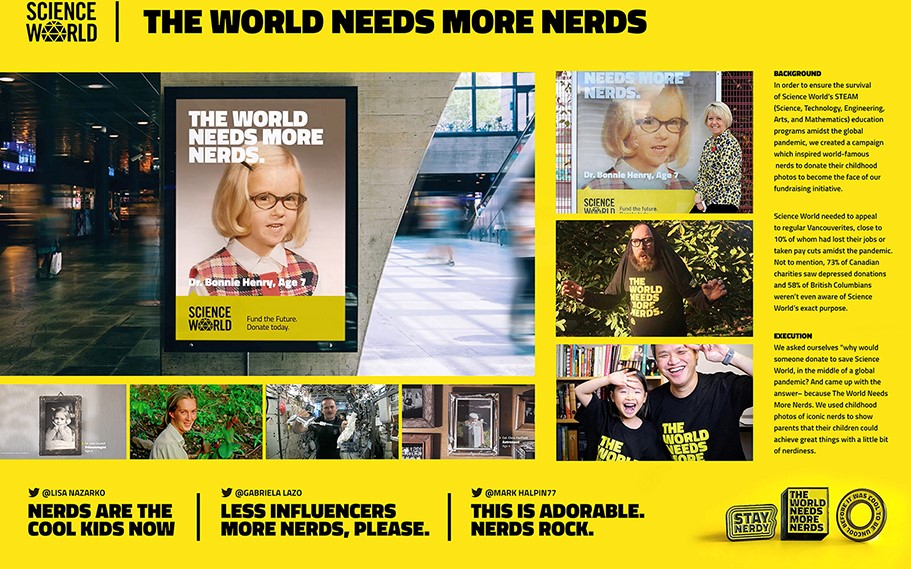
So Science World launched the "The World Needs More Nerds" campaign. Use childhood photos of the biggest names in STEAM to inspire young people to embrace their inner nerd and encourage adults to donate. This insightful campaign cemented its status as a learning center for children and proudly defied the world's anti-science rhetoric in the pandemic news feed.
The campaign quickly gained momentum, starting with a childhood photo of the province's health officer, Dr. Bonnie Henry. More than 30 famous "nerds" from around the world also joined, and countless donated photos of their childhoods to the event, including: former Canadian CSA astronaut Chris Hadfield, NFL superstar and medical graduate Born Laurent Duvenetadiv, and world-renowned behaviorist and environmentalist Dr. Jane Goodall.
The final "The World Needs More Nerds" campaign raised more than $450,000, 3x its original fundraising goal and set a record for the highest amount raised by Science World from a campaign. Social media engagement in the world of science increased by 30%.
"It is not science that needs to be saved, but we humans need science to be saved", the world of science conveys such a view, inspiring and inspiring the public to donate and pay for science. Because this not only benefits the future and future generations of mankind, but also deeply strengthens the circular meaning of "giving and receiving, giving and receiving" in public welfare behavior. By fully mobilizing the audience to become its advocates and, the audience becomes not only a donor, but also an active advocate for advancing the scientific enterprise, and the ripple effect unfolds.
Science World: The World Needs More Nerds
Brand: Science World
Brand owner: Science World
Participating agency: Rethink Toronto
Idea: Rethink Vancouver
Medium: JSI Communications Vancouver
PR: Adrian Crook & Associates Vancouver
Market: Canada
Case source: 2021 WARC Awards for Effectiveness, Bronze Award in the Instant Impact category
👉🏻WARC subscribers can click here to jump to read the full case
About the WARC Application Library
WARC has the world's largest database of effective marketing case studies: a large number of excellent cases from 125 countries covering 19 major categories. Over the decades, the WARC case library has accumulated 21,000 award-winning cases and cross-cutting proposals, including practical methods, evidence of results and empirical insights. In addition to WARC's own awards and competitions, the sources included are from 30 globally authoritative and industry-renowned award organizations, such as Cannes Lions, Effies, New York AME Awards, MMA Smarties, Shanghai International Advertising Festival (SHIAF), etc. WARC members who need strategic motivation and inspiration for pitching can use the "case finding" tool on WARC's official website at any time to search tens of thousands of items according to parameters such as industry, market, target, media channel, target audience, and budget amount, which will continue throughout the year. Updated award-winning cases to learn from and inspire.

